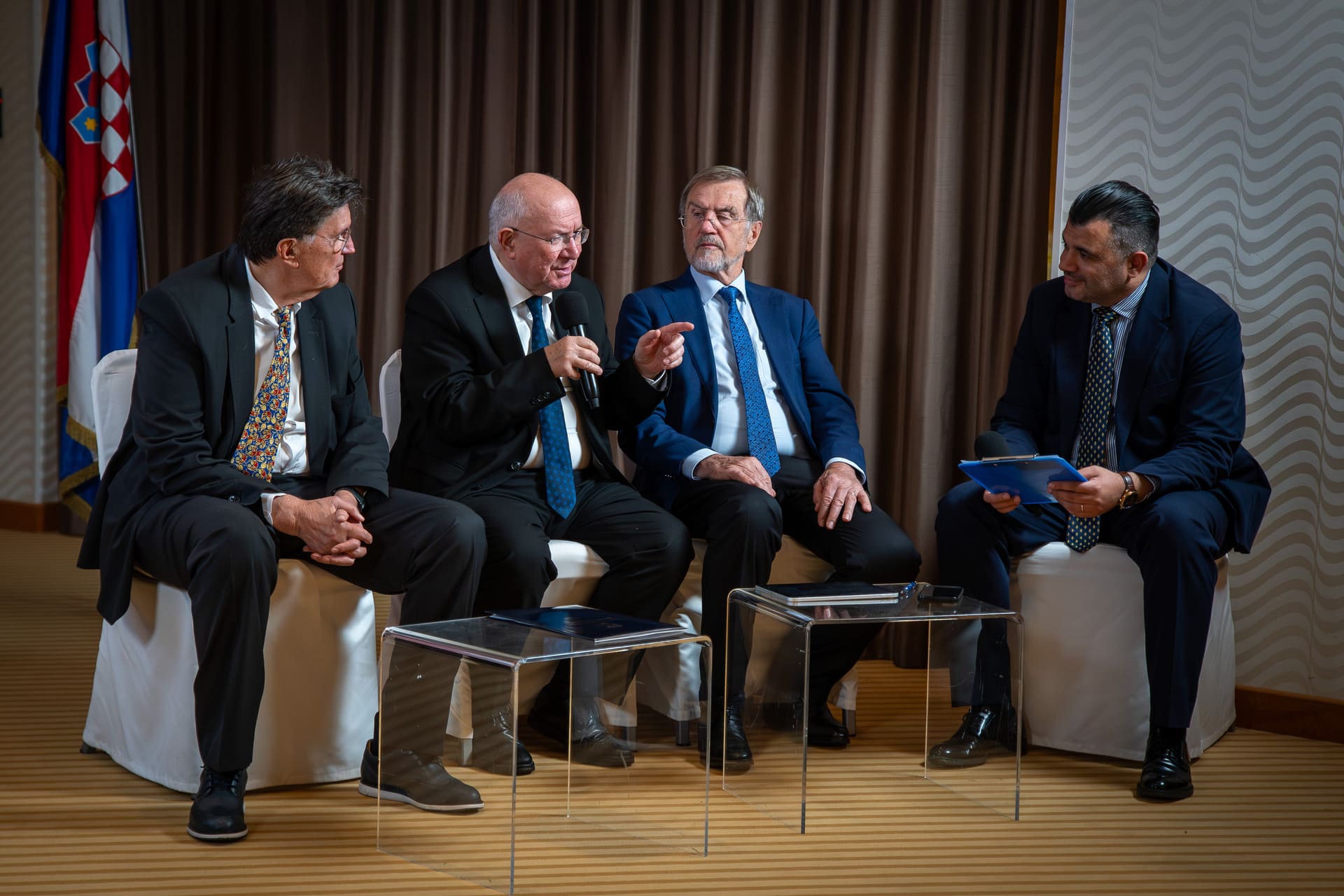This month marks the centenary of the birth of the great British stateswoman and friend of the Croatian people, the late Margaret Thatcher. The Centre for Renewal of Culture (Centar za obnovu kulture – COK) commemorated the centenary on Monday, 25 October, with a special conference held at the Hotel Dubrovnik in Zagreb, under the title ‘Margaret Thatcher 1925–2025.’ The event convened a number of her former associates and key witnesses to her involvement in the events in this part of Europe during the 1990s.
Conference ‘Margaret Thatcher 1925–2025’: Support for Independence
The welcoming address was delivered by Dr. Robin Harris, President of the Centre for Renewal of Culture and a close associate of Mrs. Thatcher. His introduction included photographs and short video clips of Mrs Thatcher during her visit to Croatia and showing her support for the independence of both Croatia and Bosnia and Herzegovina. At the time, she was under significant pressure from the then-incumbent government to remain silent on the matter, a restraint which she nevertheless refused to heed.
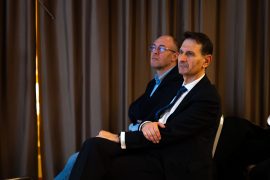
Attendees included three former Croatian Ministers of Foreign Affairs—Mate Granić, Miro Kovač, and Davor Ivo Stier—as well as the Representative of the current Minister of Foreign Affairs, Lara Romano, Members of the European Parliament Tomislav Sokol and Karlo Ressler, the Ambassador of Kosovo, and delegates from the Slovenian Embassy. Cardinal Josip Bozanić, while unable to attend due to being outside Croatia, sent a signed letter extending his greetings and wishes for the conference’s success.
The opening addresses were followed by four key presentations from Mrs. Thatcher’s associates, who described her significance both then and now. After a short break, a second section featured four speeches detailing her engagement in providing assistance to the newly formed states following the dissolution of the former Yugoslavia: Croatia, Slovenia, and Bosnia and Herzegovina. The proceedings concluded with a final panel discussion.
A Special Relationship with Ronald Reagan
The first presentation was given by John O’Sullivan, an associate of Mrs. Thatcher, one of her speechwriters, and President of the Danube Institute. He provided an analysis of the special relationship between the United Kingdom and the United States, with a specific focus on her bond with President Ronald Reagan. Mr. O’Sullivan highlighted common misconceptions surrounding this relationship, often incorrectly compared to that of Tony Blair with the US. He asserted that Mrs. Thatcher left the special relationship in a better state than she found it, whereas Mr. Blair left it in a much worse one.
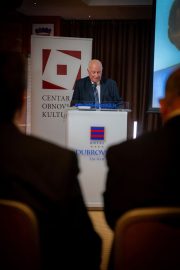
The second address was delivered by Robin Harris. He began by referencing a public opinion poll conducted around the time of her death by The Sun, in which a relative majority (28 per cent) of respondents chose her as the best post-war British Prime Minister, ahead of Churchill (24 per cent) and Blair (10 per cent), despite her having been out of the public eye for a decade. He then addressed the three main criticisms levelled by her opponents: that she caused inequality, poverty, and division.
Dr. Harris refuted these claims by arguing that her aim was not to reduce inequality, but to increase freedom. Criticisms that the poor became poorer were based on an arguably absurd relative definition of poverty (60 per cent of median income), implying that the poor could have actually become richer in absolute terms. Regarding division, he noted that great democratic leaders are ‘those who divide’ because they champion clear, substantial goals. As he put it, if everyone believed the same thing, there would be no democracy.
Success Based on Ability, Not Quotas
Keith Miles, who served as the Representative of the Republic of Slovenia in the United Kingdom until its official recognition in 1992, delivered the third presentation on the achievements of the Thatcher era. He described how he first met Mrs. Thatcher through the Institute of Economic Affairs, founded by Hayek. She found a natural ally there for her belief in halting the so-called ratchet effect: the economic drift to the left. He noted her commitment to promoting ideas such as personal responsibility, personal initiative, and private capital, which led to her involvement in establishing the Conservative Party’s think-tank, the Centre for Policy Studies.
Mr. Miles underscored her brilliant intellect and exceptional work ethic. She was described as determined, intolerant of nonsense, and possessing a strong political instinct. Globally, she demonstrated courage by supporting the right to self-determination for nations like Slovenia, in sharp contrast to the pro-Serbian stance of the British Establishment. Her success, he concluded, was the result of her abilities, not of gender quotas.
The final address in this section was presented by Marek Matraszek, a political consultant and former representative of the Margaret Thatcher Foundation for Central Europe. He sought to describe the global and historical significance of Margaret Thatcher, with an emphasis on her role in the fall of Communism and the perception of her principles in Central European countries, particularly Poland. He highlighted her pragmatism in collaborating with the Solidarity trade union, which fought for democracy and freedom. However, he concluded with regret that the influence of the Thatcher legacy is currently waning in Central Europe, where the ‘soggy centre’ of social-democratic policies dominates the economy.
Clear Support for Croatian Independence and Territorial Integrity
Following a brief refreshment break, the participants engaged in an analysis of Mrs. Thatcher’s influence during the processes of independence for Croatia, Slovenia, and Bosnia and Herzegovina.
Mate Granić, former Foreign Minister and advisor to the Prime Minister, described Mrs. Thatcher’s assistance to Croatia. This began with her clear support for Croatian independence and territorial integrity during the Homeland War. In her public appearances, including a speech to UN ambassadors in 1991, and in her books, she consistently stressed that the JNA and Serbia were responsible for the aggression against Croatia. She insisted that this was not a conflict between “two national groups,” but a struggle between communism and democracy. Mr. Granić concluded that Mrs. Thatcher undoubtedly belongs to the circle of great European statesmen whose work was primarily guided by moral values.
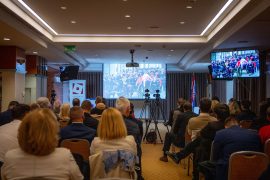
Alojz Peterle, Prime Minister of Slovenia from 1990 to 1992, shared a vivid personal memory of Mrs. Thatcher’s immediate and decisive support. Just hours after Slovenia’s declaration of independence on 26 June 1991 and the start of the JNA attack, she was the first Western politician to call him. She told him: “Mr. Prime Minister, tell me what is going on in your country. We must defend the young Slovenian democracy. I will immediately call George Bush [Sr.] and John Major.” Although no longer in office, Mr. Peterle believes she remained influential for a long time, often more so than her successor, John Major.
“Haven’t We Taught Him a Lesson?”
The speech of Dr. Drago Štambuk, former Diplomatic Representative of Croatia to the United Kingdom, was read due to his inability to attend. He noted that in the 1980s, he recognised the SANU Memorandum as a blueprint for the creation of Greater Serbia and began seeking Croatian allies in London. He eventually found one in Mrs. Thatcher, although she had left office by that time. Her strongest show of support occurred on 20 September 1991, while Belgrade was sending tanks to Vukovar. He spent the day in her office, observing her passionately lobbying for Croatian interests, telephoning world leaders and explaining the “terrible Greater-Serbian and communist aggression.”
During a subsequent meeting with a former British Military Attaché, Edward Cowan, the attaché equated the Croatian and Serbian positions, claiming there were “nationalists on both sides.” Noticing Dr. Štambuk’s displeasure, Mrs. Thatcher clenched her fist, struck her chest several times, asking: “What’s wrong with being a nationalist? I’m a British nationalist.” The attaché recoiled, and Mrs. Thatcher later turned to Dr. Štambuk and remarked: “Haven’t we taught him a lesson?” Shortly thereafter, she was preparing a press statement calling for the aggression to be stopped by force. Her political secretary warned her: “The British Government will crucify you for this.” She paused at the exit and stated: “If it’s a matter of crucifying me or Croatia, then it’s better to crucify me.”
The War’s Outcome Would Have Been Different
The final address in the series was given by Dr Ejup Ganić, former member of the Presidency of Bosnia and Herzegovina. He reflected on her prophetic statement: “When you meet a dictator, you have a chance to stop him at the beginning. If you don’t stop him, he will achieve all his goals, and he will end up being the main negotiator for a peaceful settlement to the conflict that he himself caused.” He noted that this prophecy was fulfilled with Slobodan Milošević, demonstrating her prudence and foresight. Mr. Ganić highlighted the importance of her article for the New York Times, which helped place Bosnia and Herzegovina on the global political map. Finally, he described her assistance in founding the first private university in Bosnia and Herzegovina.
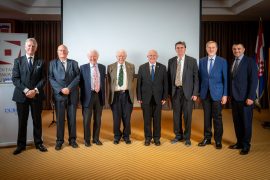
The closing panel was moderated by the Secretary of the Centre for Renewal of Culture, Mate Ćurić. Speakers reflected on the lessons Mrs. Thatcher could offer modern politicians, the Dayton Agreement, and the failure of the EU and other powers to truly grasp the situation in Yugoslavia, which she understood so quickly. All concurred that the outcome of the war would have been different had she remained in power, and that her ideas on freedom, private initiative, and sovereignty remain highly relevant today.

